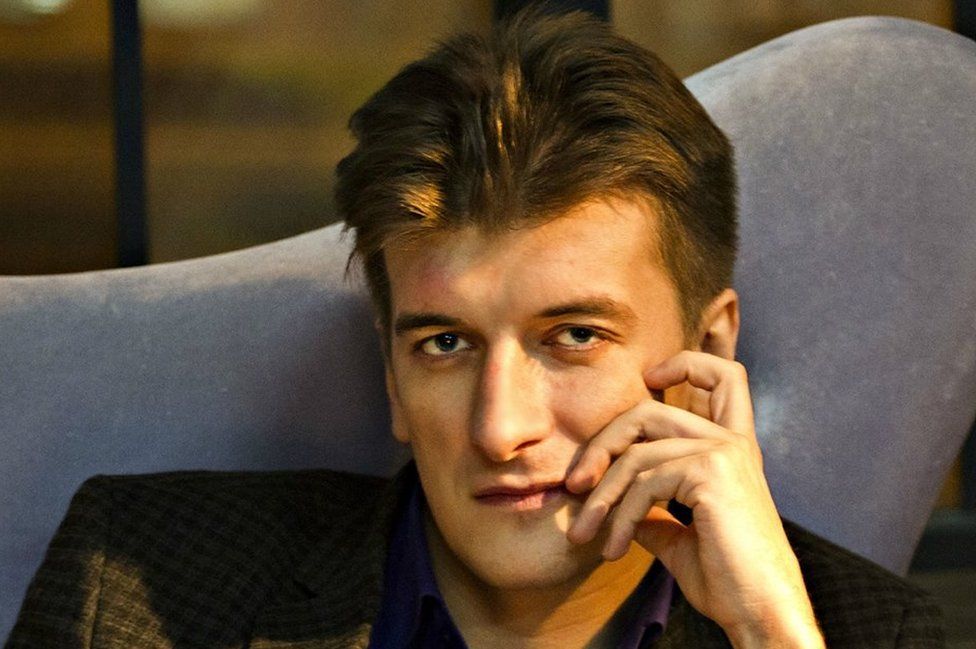Russian reporter Borodin dead after mystery fall
- Published

A Russian investigative journalist who wrote about the deaths of mercenaries in Syria has died in hospital after falling from his fifth-floor flat.
Maxim Borodin was found badly injured by neighbours in Yekaterinburg and taken to hospital, where he later died.
Local officials said no suicide note was found but the incident was unlikely to be of a criminal nature.
However, a friend revealed Borodin had said his flat had been surrounded by security men a day earlier.
Vyacheslav Bashkov described Borodin as a "principled, honest journalist" and said Borodin had contacted him at five o'clock in the morning on 11 April saying there was "someone with a weapon on his balcony and people in camouflage and masks on the staircase landing".
Borodin had been looking for a lawyer, he explained, although he later called him back saying he was wrong and that the security men had been taking part in some sort of exercise.
After he was found badly injured at the foot of the building on Thursday, regional authorities said the door of his flat had been locked from the inside, indicating that no-one else had either entered or left the flat.
The chief editor of Novy Den, where Borodin worked, said before he died that she could not rule out a crime, adding there was no reason for him to kill himself.
Harlem Désir of the international monitoring organisation OSCE said the death was "of serious concern" and called for a thorough investigation.
What did Borodin write?
In recent weeks, the journalist had written about Russian mercenaries known as the "Wagner Group" who were reportedly killed in Syria on 7 February in a confrontation with US forces.
Last week, the outgoing head of the CIA, Mike Pompeo, said that "a couple hundred" Russian mercenaries died in the clash in Deir al-Zour province. The mercenaries were apparently taking part in an attack by pro-Syrian government fighters on the headquarters of a US ally, the Syrian Democratic Forces.
Weeks later Russia admitted that several dozen Russian citizens had been either killed or wounded, but stressed they were not regular soldiers.
Last month, Borodin had written that three of those killed had come from the Sverdlovsk region in the Urals, in which Yekaterinburg is the main city. Two of the men were from the towns of Asbest and one from Kedrovoye, he said.
He had also investigated political scandals, including allegations made by a Belarusian escort known as Nastya Rybka in a video posted by Russian opposition leader Alexei Navalny.
Journalism is a dangerous business in Russia
Journalists in Russia have often been harassed or attacked in recent years for their work. On the same day that Maxim Borodin was found fatally injured, the editor of an official regional newspaper was assaulted in Yekaterinburg, reports say.
Much of Russia's media is controlled by the state and Russia is ranked 83rd out of 100 countries for press freedom by Freedom House.
One of Russia's best-known investigative reporters, Anna Politkovskaya, was shot dead in a lift at her block of flats in 2006. Politkovskaya exposed Russian human rights abuses in Chechnya.
Two years later, journalist Mikhail Beketov was left brain-damaged. He had highlighted corruption and fought against the planned destruction of the Khimki forest near Moscow to make way for a road. He died in 2013.
Oleg Kashin, was severely injured in an assault in Moscow in 2010. He had been reporting on protests against the Khimki forest highway.
Last year, well-known Russian radio presenter Tatyana Felgengauer was stabbed in the neck while at work at her radio station, Ekho Mosvky.
- Published20 February 2018